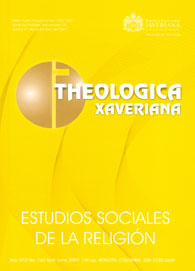Resumo
Pese a ser un campo académico poco desarrollado, el lenguaje filosófico hindú ha penetrado en la mentalidad occidental. Aunque conceptos como yoga, karma o reencarnación han entrado en el discurso occidental, han sido apropiados con una tendencia a promover nociones predeterminadas del sí mismo y no a representar algo propiamente hindú. Por esta razón tales discursos reflejan más bien formas de pensamiento occidental. Este artículo analiza el concepto de “sí mismo” como ha sido desarrollado en textos sánscritos primitivos, incluyendo el Sâmkhyakârika y los escritos del pensador del vedânta OEankara, para mostrar que las nociones occidentales del sí mismo presentan un marco por completo inadecuado para interpretar el sí mismo hindú.
Esta revista científica se encuentra registrada bajo la licencia Creative Commons Reconocimiento 4.0 Internacional. Por lo tanto, esta obra se puede reproducir, distribuir y comunicar públicamente en formato digital, siempre que se reconozca el nombre de los autores y a la Pontificia Universidad Javeriana. Se permite citar, adaptar, transformar, autoarchivar, republicar y crear a partir del material, para cualquier finalidad (incluso comercial), siempre que se reconozca adecuadamente la autoría, se proporcione un enlace a la obra original y se indique si se han realizado cambios. La Pontificia Universidad Javeriana no retiene los derechos sobre las obras publicadas y los contenidos son responsabilidad exclusiva de los autores, quienes conservan sus derechos morales, intelectuales, de privacidad y publicidad.
El aval sobre la intervención de la obra (revisión, corrección de estilo, traducción, diagramación) y su posterior divulgación se otorga mediante una licencia de uso y no a través de una cesión de derechos, lo que representa que la revista y la Pontificia Universidad Javeriana se eximen de cualquier responsabilidad que se pueda derivar de una mala práctica ética por parte de los autores. En consecuencia de la protección brindada por la licencia de uso, la revista no se encuentra en la obligación de publicar retractaciones o modificar la información ya publicada, a no ser que la errata surja del proceso de gestión editorial. La publicación de contenidos en esta revista no representa regalías para los contribuyentes.


